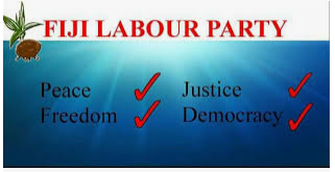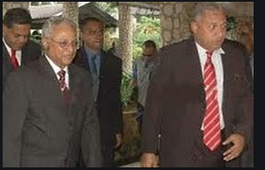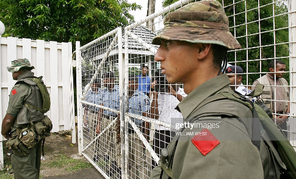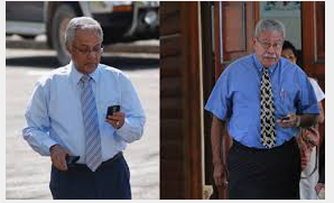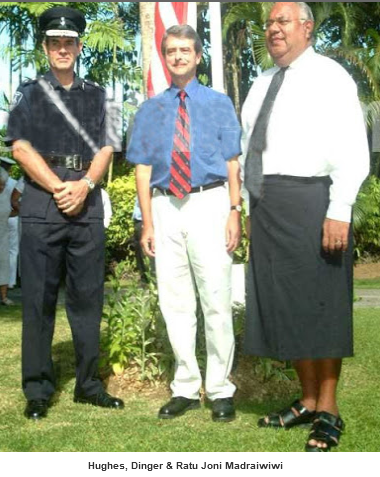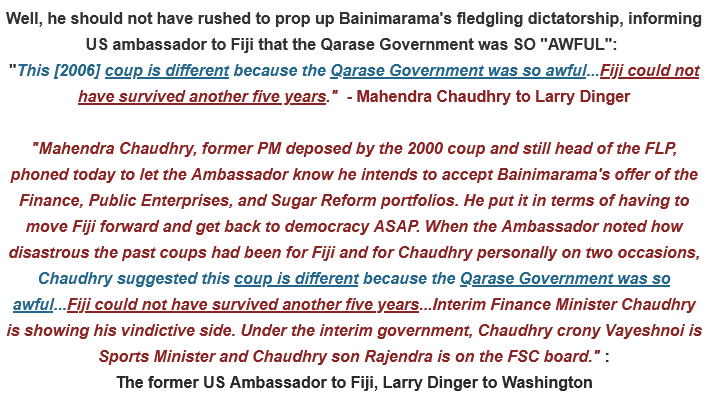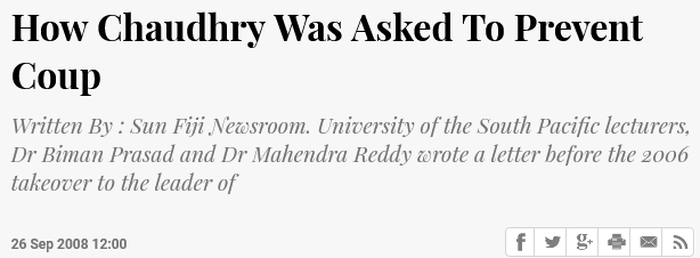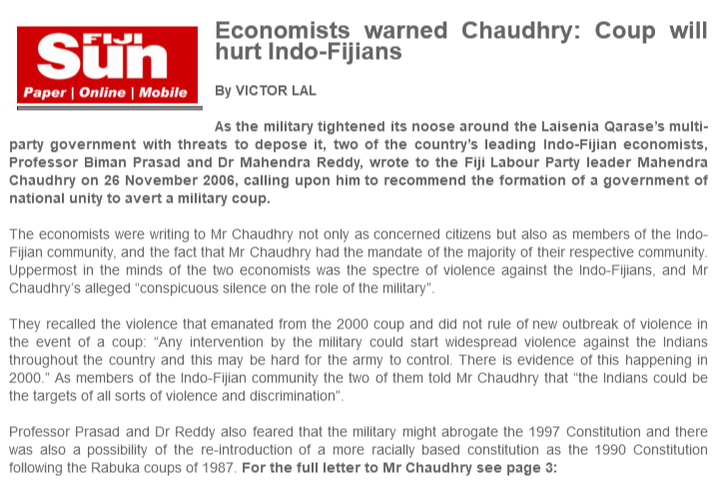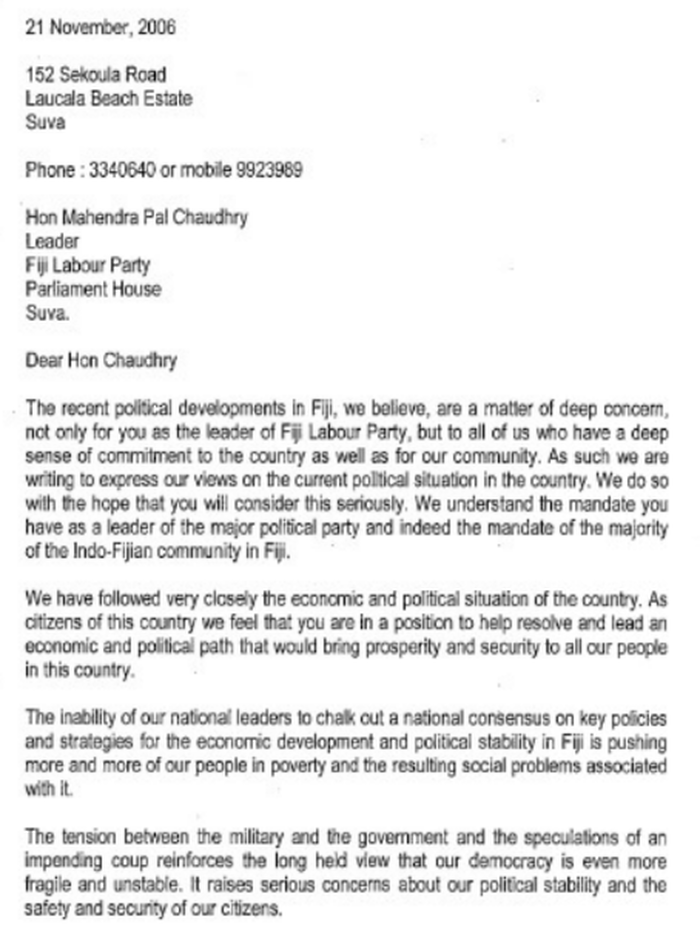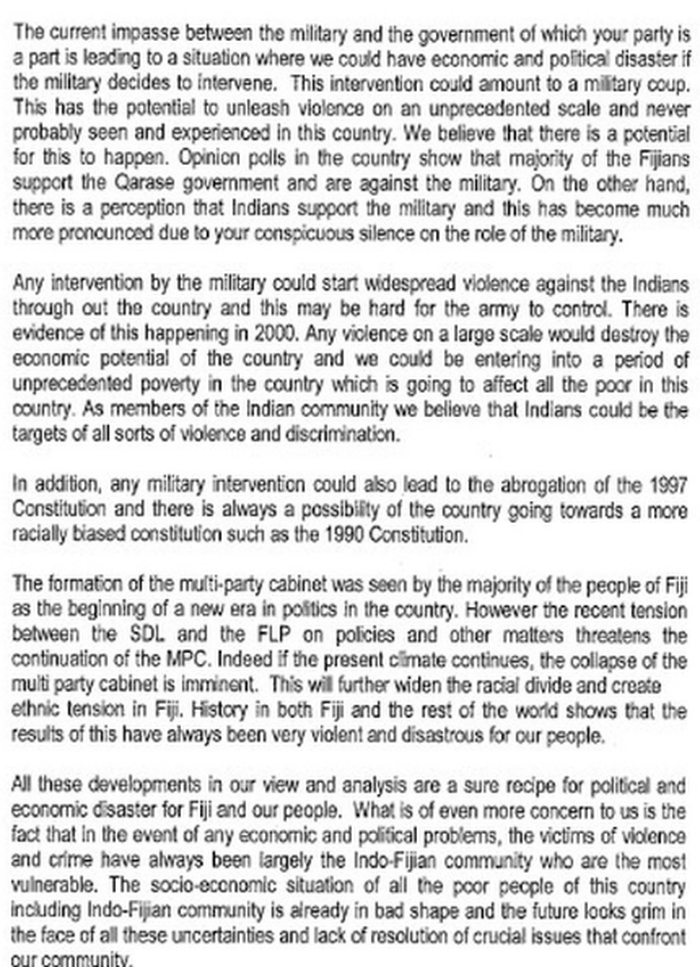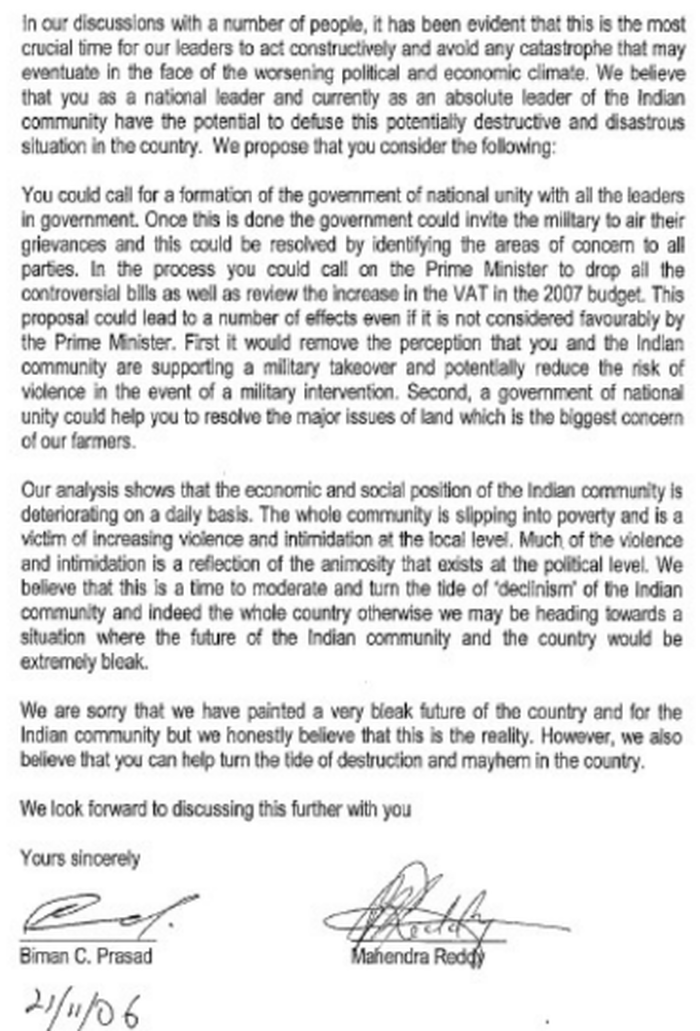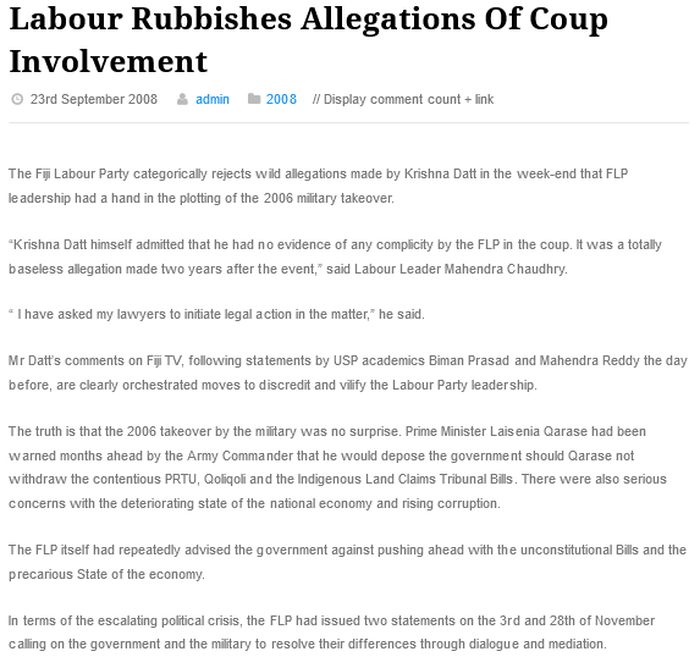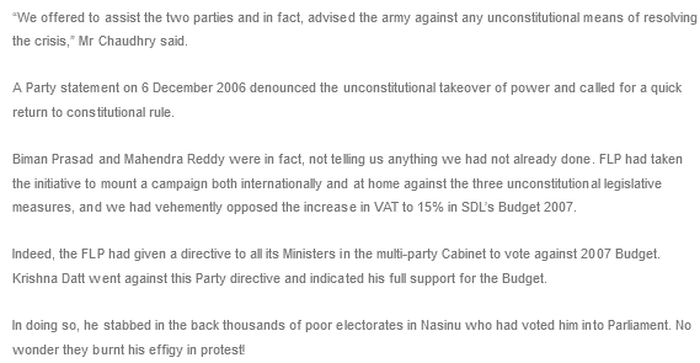Fijileaks: Road to Totalitarianism began with the 2006 treasonous Coup
FLP Statement on the Draft Police Bill
The Road to Totalitarianism.
The draft Police Bill is the culmination of a series of recent developments that have trampled on the individual rights and freedoms of our people, says Labour Leader Mahendra Chaudhry.
It has created an aura of fear and apprehension and has been strongly condemned by members of civil society, opposition political parties as well as members of the public.
The draft, as it stands, is draconian and will reduce Fiji to a Police State, say critics. A look at some of the provisions of the Bill, certainly justify such criticism.
The penalties for non-compliance are unbelievable - $1m fine for a telecommunications service provider that fails to provide information and access; life imprisonment for individuals who do not comply, and many more.
They violate international conventions on human rights and individual freedoms, the right to privacy, and stand in breach of our own Bill of Rights provisions in the 2013 Constitution.
But Mr Chaudhry says he is not surprised at the extent to which the FF government will go to reduce our once proud Police Force into an instrument of the State.
He said the nation has been moving surely and steadily towards a state of totalitarianism despite Fiji’s so-called return to parliamentary rule following the 2014 general elections
He said the government had shown scant regard for the rule of law, citing the manner in which USP Vice Chancellor Prof Pal Ahluwalia was deported as an example.
Total Control
He said government had taken unilateral control of all apparatus of the State. The public service had been politicized and administrative decisions now rested with the Ministers rather than the Permanent Secretaries.
Fiji’s democratic institutions had either been demolished or rendered ineffectual with elections not allowed at the secondary level ie local government and provincial councils.
Checks and balances that had existed in the past to keep governments accountable had been removed. He cited the case of the Constitutional Offices Commission the independence of which was completely removed with the prime minister sitting as its chair.
The two electoral institutions – the Office of the Supervisor of Elections and the Elections Office- were also no longer independent and did not enjoy the trust of the people.
Mr Chaudhry said a series of recent Bills continued this trend towards total control. He cited the recent two judicial Bills which removed the system of appointing assessors to criminal proceedings and the Bill which proposed a special court to deal with cases of corruption, removing it from the jurisdiction of the established courts.
Electoral laws tightened
The electoral laws were being tightened to make it very difficult for opposition political parties to raise sufficient funds to mount effective election campaigns ahead of the 2022 general elections.
Proposed changes to the laws will remove an aggrieved candidate’s right of appeal to the High Court against decisions of the Supervisor of Elections and the Registrar and vest it with the Electoral Commission which was no longer functioning as an impartial and independent institution.
The proposed amendment was also in breach of the Bill of Rights in the Constitution which enshrined the right of every party to a civil dispute to have the matter determined by a court of law or if appropriate an independent or impartial tribunal.
Repressive Envrionment
Mr Chaudhry said Parliament had also been rendered ineffective as a chamber where national issues could be robustly debated and government held accountable, with changes to Standing Orders and well established conventions. Bills were being fast tracked under Standing Order 51 thus preventing proper debate and public discussions on them.
Not only had debate in Parliament been stifled but the local media was also operating under severe constraints which undermined freedom of speech and expression. Trade Unions had been emaciated and their right to collective bargaining largely removed; their right to association and assembly severely curtailed.
On the other hand, the security forces were being specially groomed to become instruments of the State and subservient to an autocratic government that showed scant regard for human rights or the rule of law.
Security Forces - instruments of State
At a time when every other government ministry was subjected to budget cuts, the Army and Police budgets were being hiked and personnel increased. The RFMF had been prescribed an unprecedentedly elevated role as guardians of the nation. Section 131 (2) of the 2013 constitution gave it the responsibility “to ensure at all times the security, defence and well being of Fiji and all Fijains”.
This was a new provision which did not exist in the 1997 constitution which had in fact stated that the Commander in the exercise of military executive command of the Force was “subject to the control of the Minister”. Why was this provision removed from the 2013 Constitution, Mr Chaudhry asked?
He said the people of Fiji lacked confidence in the Army and the Police both of whom had been condemned internationally for their brutality and abuse of human rights.
Unrestrained powers
“It is against such a suffocating and repressive environment that one must view the draconian provisions of the Draft Police Bill,” Mr Chaudhry said.
“A Bill that allows the Police unlimited powers to enter premises without warrant, seize equipment, install tracking, monitoring and hearing devices, secretly and by force, if necessary – is sufficient to arouse fear and panic among the citizens.
“There is understandable fear that such unrestrained powers may lead to excesses and pose a threat to our democratic processes,” Mr Chaudhry said.
The Road to Totalitarianism.
The draft Police Bill is the culmination of a series of recent developments that have trampled on the individual rights and freedoms of our people, says Labour Leader Mahendra Chaudhry.
It has created an aura of fear and apprehension and has been strongly condemned by members of civil society, opposition political parties as well as members of the public.
The draft, as it stands, is draconian and will reduce Fiji to a Police State, say critics. A look at some of the provisions of the Bill, certainly justify such criticism.
The penalties for non-compliance are unbelievable - $1m fine for a telecommunications service provider that fails to provide information and access; life imprisonment for individuals who do not comply, and many more.
They violate international conventions on human rights and individual freedoms, the right to privacy, and stand in breach of our own Bill of Rights provisions in the 2013 Constitution.
But Mr Chaudhry says he is not surprised at the extent to which the FF government will go to reduce our once proud Police Force into an instrument of the State.
He said the nation has been moving surely and steadily towards a state of totalitarianism despite Fiji’s so-called return to parliamentary rule following the 2014 general elections
He said the government had shown scant regard for the rule of law, citing the manner in which USP Vice Chancellor Prof Pal Ahluwalia was deported as an example.
Total Control
He said government had taken unilateral control of all apparatus of the State. The public service had been politicized and administrative decisions now rested with the Ministers rather than the Permanent Secretaries.
Fiji’s democratic institutions had either been demolished or rendered ineffectual with elections not allowed at the secondary level ie local government and provincial councils.
Checks and balances that had existed in the past to keep governments accountable had been removed. He cited the case of the Constitutional Offices Commission the independence of which was completely removed with the prime minister sitting as its chair.
The two electoral institutions – the Office of the Supervisor of Elections and the Elections Office- were also no longer independent and did not enjoy the trust of the people.
Mr Chaudhry said a series of recent Bills continued this trend towards total control. He cited the recent two judicial Bills which removed the system of appointing assessors to criminal proceedings and the Bill which proposed a special court to deal with cases of corruption, removing it from the jurisdiction of the established courts.
Electoral laws tightened
The electoral laws were being tightened to make it very difficult for opposition political parties to raise sufficient funds to mount effective election campaigns ahead of the 2022 general elections.
Proposed changes to the laws will remove an aggrieved candidate’s right of appeal to the High Court against decisions of the Supervisor of Elections and the Registrar and vest it with the Electoral Commission which was no longer functioning as an impartial and independent institution.
The proposed amendment was also in breach of the Bill of Rights in the Constitution which enshrined the right of every party to a civil dispute to have the matter determined by a court of law or if appropriate an independent or impartial tribunal.
Repressive Envrionment
Mr Chaudhry said Parliament had also been rendered ineffective as a chamber where national issues could be robustly debated and government held accountable, with changes to Standing Orders and well established conventions. Bills were being fast tracked under Standing Order 51 thus preventing proper debate and public discussions on them.
Not only had debate in Parliament been stifled but the local media was also operating under severe constraints which undermined freedom of speech and expression. Trade Unions had been emaciated and their right to collective bargaining largely removed; their right to association and assembly severely curtailed.
On the other hand, the security forces were being specially groomed to become instruments of the State and subservient to an autocratic government that showed scant regard for human rights or the rule of law.
Security Forces - instruments of State
At a time when every other government ministry was subjected to budget cuts, the Army and Police budgets were being hiked and personnel increased. The RFMF had been prescribed an unprecedentedly elevated role as guardians of the nation. Section 131 (2) of the 2013 constitution gave it the responsibility “to ensure at all times the security, defence and well being of Fiji and all Fijains”.
This was a new provision which did not exist in the 1997 constitution which had in fact stated that the Commander in the exercise of military executive command of the Force was “subject to the control of the Minister”. Why was this provision removed from the 2013 Constitution, Mr Chaudhry asked?
He said the people of Fiji lacked confidence in the Army and the Police both of whom had been condemned internationally for their brutality and abuse of human rights.
Unrestrained powers
“It is against such a suffocating and repressive environment that one must view the draconian provisions of the Draft Police Bill,” Mr Chaudhry said.
“A Bill that allows the Police unlimited powers to enter premises without warrant, seize equipment, install tracking, monitoring and hearing devices, secretly and by force, if necessary – is sufficient to arouse fear and panic among the citizens.
“There is understandable fear that such unrestrained powers may lead to excesses and pose a threat to our democratic processes,” Mr Chaudhry said.
